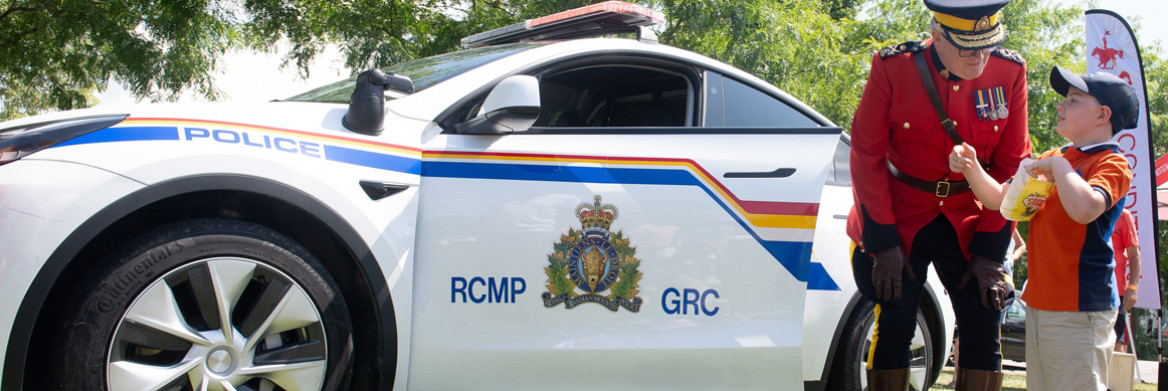The RCMP is driving change by shifting its on-road light duty fleet to zero-emission vehicles (ZEVs), where operationally feasible, by 2035. Officers at two RCMP detachments took to the road early in 2023 to start using the Tesla Model Y, one of several different models to be tested.
British Columbia's West Shore detachment and Ontario's Rideau Hall Response Unit were the first to test the new vehicles in daily operations. The fully upfit mid-size SUVs have been on the road since January 2023 and officers are getting a feel for how they perform as police vehicles in the field for their day-to-day operations.
"The Tesla seems to be very well liked by the officers," says Corporal Didier Thibault, team lead of the Rideau Hall Response Team in Ottawa. "It's always the first car selected when members sign in. They even come in earlier to get the car."
Officers on the response team patrol the Rideau Hall grounds, spending much of the day in the vehicle at various posts on the property. Even though there isn't extensive driving involved, ergonomics is a key consideration due to the long hours spent in the idling vehicles.
"The ergonomics are better compared to our standard police vehicle, but for taller and larger members, there's still not as much room as a larger SUV," says Thibault.
Speeding up availability
The field testing has brought attention to several factors that will help the RCMP move forward with greening its fleet.
One challenge the RCMP has faced in testing is equipping or "upfitting" retail vehicles with policing equipment that were not designed for police operations. "Zero-emission, purpose-built police vehicles are only now becoming available to the Canadian market," says Andres Casimiri, manager of the RCMP's National Fleet Program. "That means we had to buy retail vehicles and contract the upfitting to a vendor."
Casimiri acknowledges that using retail vehicles demands greater foresight and resources. But, he says it also provides excellent insight on the opportunities and challenges to expect when ensuring that policing vehicles are suitable for operations.
The Teslas were the first vehicles delivered for testing and were upfitted with policing equipment by a vendor. They were ready for the road within nine months. The National Fleet Program is waiting for the two other testing vehicles, the Ford Mach-E and the Ford F150 Lightning. The RCMP has also ordered the Chevrolet Blazer EV PPV, a purpose-built policing vehicle. The new vehicles are expected to be equipped and ready for testing in 2024.
Facing challenges head-on
While the team leading the zero-emission vehicle migration is confident the market will be able to produce purpose-built policing vehicles well suited for urban areas, there are potential challenges for remote detachments given the vast areas officers cover. The team is still exploring charging systems to ensure proper infrastructure is in place to support detachments, and collecting data on vehicles operating in northern and remote locations to evaluate the challenges those areas encounter and ensure ZEV suitability.
At the West Shore detachment in British Columbia, battery life and vehicle range hasn't been a problem. "Charging has been easy; we drive in and plug it in," says Constable Mark Hall. "The lowest an officer got the battery to was about 56 per cent. It's nice not to have to worry about refuelling on the road."
In addition, the eliminated gasoline cost is another obvious advantage in the shift toward green vehicles despite their higher upfront purchase cost – resulting in a lower ownership cost over time.
Navigating the road ahead
As the RCMP moves forward, guided by its Vision 150 and Beyond priorities and the Treasury Board Secretariat's Greening Government Strategy, there's still a lot to consider.
"A technology shift of this magnitude can redefine how we approach patrol operations," says Yves Madore, project lead for the fleet modernization project. "That's why we're talking to every facet of RCMP operations to identify areas of improvement that are fundamental to advanced technology ZEVs."
